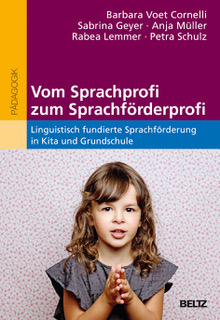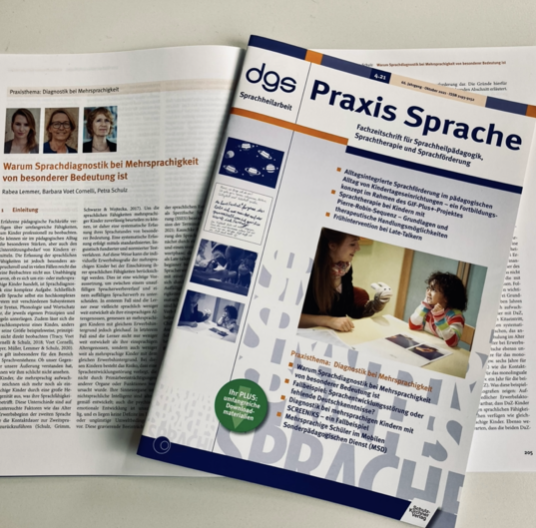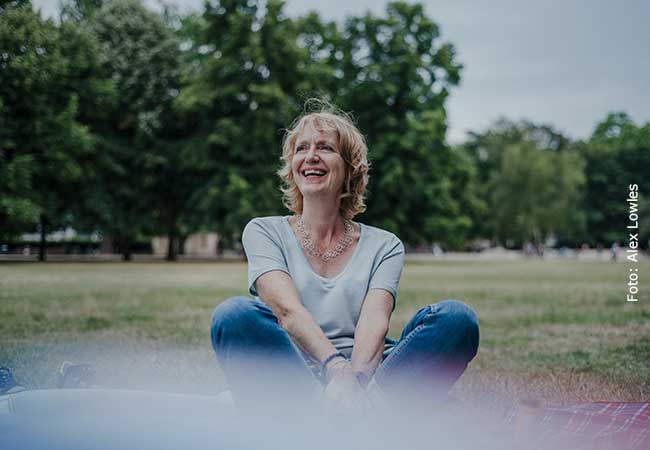Deutsch als Zweitsprache - Theorie und Didaktik des Zweitspracherwerbs
Current projects

CRC 1629: Negation in language and beyond (NegLaB)
Funded by the German Research Foundation 4/2024 – 12/2027
The ability to express negation is one of the fundamental and universal characteristics of human language. Linguistic and non-linguistic cognitive processes are involved in the acquisition and processing of negation, the relationship between which is still poorly understood. Researchers from the fields of linguistics and psychology are working in the Collaborative Research Center "Negation in language and beyond (NegLaB)" on open questions about the function of negation in language (spokesperson: Professor Dr. Cecilia Poletto). The aim is to develop a theoretical perspective on how negation manifests itself in natural languages, how it is acquired and processed and why its concrete expression differs so much between languages. In this way, the network aims to contribute to a better understanding of the connections between linguistic competence and general cognition.
The CRC will start on April 1, 2024; the first funding period ends December 31, 2027. For this period, the CRC NegLaB receives total funding of around 9.3 million Euros. For more information about the CRC, see here: https://gepris.dfg.de/gepris/projekt/509468465
Merle Weicker and Petra Schulz will lead two projects within the CRC NegLaB.

C03: Negation beyond language: Interactions between verbal
and nonverbal negation
Caroline Dudschig (PI)
Merle Wecker (PI)
In this project,
negation is investigated as a multimodal phenomenon, i.e., in speech and in
speech-accompanying bodily expressions such as manual gestures, head shaking,
and facial expressions. Taking a psycholinguistic and cognitive-oriented
processing perspective, we address comprehension aspects of nonverbal negation
from the listener's perspective. We examine the types and functions of
nonverbal negation and their integration with verbal negation in both
German-speaking adults and children. Moreover, we aim to open our
investigations to the speaker's perspective and investigate aspects of adults'
usage of nonverbal and verbal negation to identify the contexts in which verbal
and nonverbal negation is used.

C06: Comprehension of
Negation in Child and Adult Speakers of Spanish and German (NegPos)
Sol Lago (PI)
Esther Rinke (PI)
Petra Schulz (PI)
Our project investigates the assumption that cross-linguistic
differences in the morpho-syntactic form of negation can lead to differences in
the processing and acquisition of negation in typologically different
languages. Specifically, we compare negation in German and Spanish: in Spanish,
the negator appears in an early surface position in the sentence, before the
finite verb. In German, the negator appears late and after the finite verb.
Furthermore, sentence negation in Spanish is restricted to a single, preverbal
position, whereas in German the sentence negator can appear in different
surface positions. We investigate whether these cross-linguistic differences
influence the way adults comprehend negated sentences and the way children
acquire negation.
Vari |
|
Vari: How monolingual preschool children deal with linguistic variationsince 2021 Prof. Dr. Petra Schulz (PI) The project investigates how preschool children deal with linguistic variation. The focus is on the acquisition of adjectives such as big, clean, or yellow. The project contributes to the question how children acquire the grammatical rules and the meaning of utterances in their first language when the input is inconsistent. Vari: Der Umgang mit sprachlicher Variation bei monolingualen Kindern im Vorschulalterseit 2021 Prof. Dr. Petra Schulz (PI) Das Projekt untersucht, wie Kinder im Vorschulalter mit Variation in der Sprache umgehen. Der inhaltliche Fokus liegt auf dem Erwerb von Adjektiven wie groß, sauber oder gelb. Damit leistet das Projekt einen Beitrag zu der Frage, wie Kinder die grammatischen Regeln ihrer Erstsprache und die Bedeutung von Äußerungen erwerben können, wenn der sprachliche Input nicht eindeutig ist. |
|
Sprachförderprofis
in BiSS-Transfer |
|
| BiSS-Transfer
Network „Sprachförderprofis“
Funded by Ministry of Education and Teacher Academy, Hesse since
2023 Prof. Dr. Petra Schulz (PI) In the Hessian BiSS transfer network
"Sprachförderprofis", participating elementary schools, cooperating
day care centers and vocational schools for social work are supported in
further developing their language support concept and in implementing the linguistically
based approach of the "Sprachförderprofis" in a sustainable
manner. As part of the scientific
support provided by the DaZ unit, a tailor-made, specific advisory, training
and coaching service is being developed for the participating institutions and
networking is being supported. BiSS-Transfer Verbund „Sprachförderprofis“ Gefördert vom Hessischen Kultusministerium und
der Hessischen Lehrkräfteakademie seit 2023 Prof. Dr. Petra Schulz (PI) Im hessischen BiSS-Transfer-Verbund „Sprachförderprofis"
werden teilnehmende Grundschulen, Fachschulen für Sozialwesen sowie jeweils kooperierende
Kitas darin unterstützt, ihr Sprachförderkonzept weiterzuentwickeln und den
linguistisch fundierten Ansatz der „Sprachförderprofis" nachhaltig darin zu
implementieren. Im Rahmen der wissenschaftlichen Begleitung durch die
Arbeitseinheit DaZ wird ein passgenaues spezifisches Beratungs-, Fortbildungs-
und Coachingangebot für die beteiligten Institutionen entwickelt und die
Netzwerkbildung unterstützt. |
|
DaZ ab 6 |
|
|
|
Child second language acquisition after age 6Funded by the Ministry for Higher Education, Research and the Arts, Hesse since 2018 Prof. Dr. Petra Schulz (PI) The project investigates the second language acquisition of school-age learners who had their first systematic exposure to German as children or adolescents. The main focus is on the comprehension and production of connectives, i.e. elements that link sentences in multifold ways. For example, connectives are the subordinating conjunctions als 'when', nachdem 'after' and weil 'because'. Across all languages, connectives encode logical relations such as temporal sequence or causality. However, as their specific use differs across languages, learning connectives is difficult for L2 learners. DaZ ab 6Gefördert vom Hessischen Ministerium für Wissenschaft und Kunst, Hessen seit 2018 Prof. Dr. Petra Schulz (PI) In dem Projekt DaZ ab 6 wird der Spracherwerb von Lernenden untersucht, die den ersten systematischen Kontakt zum Deutschen im Kindes- bzw. Jugendalter haben. Der Schwerpunkt liegt auf dem Verständnis und der Verwendung von Konnektoren, d.h. lexikalischen Elementen, die Sätze miteinander verknüpfen. Dazu gehören Subjunktionen wie als und nachdem oder weil. Auch wenn Konnektoren in jeder Sprache logische Relationen wie zeitliche Abfolge oder Kausalität ausdrücken, unterscheidet sich die konkrete Verwendungsweise je nach Sprache. Daher stellen Konnektoren eine Herausforderung für Zweitsprachlerner*innen dar. |
Sprachförderprofis |
|
|
|
Sprachförderprofis: Professionalization of educators for language support of multilingual children Funded by the Ministry of Education, Hesse, Polytechnic Foundation of Frankfurt am Main, City of Frankfurt since 2016 Prof. Dr. Petra Schulz (PI) The project Sprachförderprofis offers a joint training program for kindergarten and elementary school teachers. The teachers learn to plan language support settings in small groups based on current insights from linguistics and language acquisition. Sprachförderprofis: Professionalisierung von Sprachförderkräften in Kitas und Grundschulen seit 2016
Im Projekt Sprachförderprofis werden Sprachförderkräfte aus Kindertagesstätten und Grundschulen im Bereich Sprache gemeinsam systematisch qualifiziert. Die Fachkräfte lernen, linguistisch fundierte Sprachförderung zu konzipieren und diese flexibel sowohl in Großgruppen als auch in Kleingruppen für Kinder mit besonderem Förderbedarf (vor allem Deutsch als Zweitsprache) umzusetzen. |
DFG Graduate school Nominal Modification |
|
| DFG Graduate school Nominal Modification
Funded by the Deutsche Forschungsgemeinschaft (DFG) since 2014 Prof. Dr. phil. Esther Rinke (Spokesperson) The overarching theme of this linguistic RTG is the grammar of nominal expressions and their modifications. Nouns can be modified with various constructions, such as adjectives (the big car), prepositional phrases (the car with the sun roof) or relative clauses (the car which is standing in the car park). The researchers will analyse the underlying mechanisms, which they will be looking at from a syntactic and a semantic perspective, as well as within the context of various linguistic sub-disciplines. With this cross-linguistic approach as a basis, it is intended to create a linguistics research platform with an international profile. |
|
Info-DaZ |
|
|
Info-DaZ: Research and knowledge transfer center for German as a second language since 2009 Prof. Dr. Petra Schulz (PI) Info-DaZ transfers scientific findings regarding (second) language acquisition into pedagogical contexts (e.g. kindergarten, primary school, school administration). The project offers professional trainings and coachings in linguistically based language intervention. Info-Daz: Informations- und Forschungsstelle Deutsch als Zweitsprache seit 2009 Prof. Dr. Petra Schulz (PI) Info-DaZ transferiert wissenschaftliche Erkenntnisse relevanter Bereiche der Zweit- und Mehrsprachigkeitsforschung in die pädagogische Praxis. Der Wissenstransfer folgt der Leitidee, dass die Beschäftigung mit Sprache eine entscheidende Voraussetzung ist, um eine Sensibilisierung für die multikulturelle Gesellschaft und vielsprachige Schüler*innen zu erreichen. Hauptaufgabe sind Fortbildungs- und Beratungsangebote für Lehrer*innen, Erzieher*innen, Praxiskräfte in Schulen und außerschulischen Einrichtungen. Dabei sollen bereits entwickelte Handlungskompetenzen gestärkt werden, indem Wissen über den Spracherwerb und über konkrete Formen der Sprachstandserhebung und -förderung vermittelt und somit die Reflexion der eigenen Praxis unterstützt wird. |
Completed projects
Wichtige Hinweise
Neue Fortbildungstermine der Sprachförderprofis für Frühjahr 2024

Für Lehrkräfte aus ganz Hessen:
27.02.2024, 14:30-18:30 Uhr:
Grundlagen
12.03.2024, 14:30-18:30 Uhr: Spracherwerb
23.04.2024, 14:30-18:30 Uhr: Diagnostik
07.05.2024, 14:30-18:30 Uhr: Förderung
Für Kitafachkräfte und Lehrkräfte aus
Frankfurt:
29.02.2024, 14-18 Uhr: Grundlagen
14.03.2024, 14-18 Uhr: Spracherwerb
25.04.2024, 14-18 Uhr: Diagnostik
16.05.2024, 14-18 Uhr: Förderung
Alle Fortbildungstermine
finden in Präsenz an der Goethe-Universität statt. Anmeldungen
gerne über sprachfoerderprofis@em.uni-frankfurt.de
Wichtige Hinweise
Im Projekt „Sprachförderprofis“ werden seit Herbst 2016
Pädagoginnen und Pädagogen an der Goethe-Universität geschult für den Umgang
mit Kindern, die Sprachförderbedarf in der deutschen Sprache haben. Am 20.
September gehen die Fortbildungen in die dritte Runde – und werden systematisch
in ganz Hessen verankert.
Zum Artikel geht es [hier]
Wichtige Hinweise
2. Auflage erschienen
Vom Sprachprofi zum Sprachförderprofi
Linguistisch fundierte Sprachförderung in Kita und Grundschule

Dieses Fachbuch
bereitet Sprachförderkräfte auf die wichtige Aufgabe vor, Kinder mit Deutsch
als Erstsprache wie auch Kinder mit Deutsch als Zweitsprache so zu
unterstützen, dass alle gleichermaßen von den Bildungsangeboten in Kita und
Grundschule profitieren. Basierend auf aktuellen Forschungsergebnissen zum
Erst- und Zweitspracherwerb liefert es das nötige Hintergrundwissen und
konkrete Förderanregungen. In acht Fördereinheiten für Kita und Grundschule
zeigen die Autorinnen, wie linguistisch fundierte Sprachförderung umgesetzt
werden kann.
Die 2. Auflage wurde vollständig aktualisiert und enthält
Querverweise zum Einsatz der gleichnamigen Förderbox der Autorinnen, die 2022 im
Beltz Verlag erschienen ist. Das Buch wendet sich an pädagogische Fachkräfte,
Lehrkräfte und Studierende sowie an Ausbilder_innen.
Weitere Informationen finden Sie hier!
Eine neue Rezension zu Buch und Förderbox finden Sie hier.
Wichtige Hinweise
Die Sprachförderprofis und Lise-DaZ werden in der Handreichung des HKM zur Deutschförderung in Vorlaufkursen vorgestellt.
Die Publikation finden Sie hier.
Wichtige Hinweise
New paper out by Rabea, Barbara, and Petra

Lemmer, R., Voet Cornelli, B. & Schulz, P. (2021). Warum Sprachdiagnostik bei Mehrsprachigkeit von besonderer Bedeutung ist. Praxis Sprache, 4, 204–210.
Wichtige Hinweise
Petra Schulz Fellow At the Netherlands Institute for Advanced Study (NIAS), Amsterdam

Petra Schulz has been awarded a NIAS-Lorentz Theme Group Fellowship at the Netherlands Institute for Advanced Study (NIAS), Amsterdam, one of the Institutes of the Royal Netherlands Academy of Arts and Sciences (KNAW) for the winter term 2021/2022. The Theme Group will focus on Accessible Tools for Language Assessment at School (ATLAS).
More information can be found here.
Wichtige Hinweise
Unser Buch "Vom Sprachprofi zum Sprachförderprofi. Linguistisch fundierte Sprachförderung in Kita und Grundschule" veröffentlicht im Beltz Verlag

Dieses Fachbuch bereitet Sprachförderkräfte auf die wichtige Aufgabe der Sprachförderung am Übergang zwischen Kita und Grundschule vor. Basierend auf aktuellen Forschungsergebnissen zum Erst- und Zweitspracherwerb liefert es das nötige Hintergrundwissen und konkrete Förderanregungen. In acht Fördereinheiten für Kita und Grundschule zeigen die Autorinnen, wie linguistisch fundierte Sprach-förderung umgesetzt werden kann.
Mit umfangreichem Material zum Download.
Weitere Informationen finden Sie hier.
Kontakt
Anschrift:
Goethe-Universität
Institut für Psycholinguistik und Didaktik der deutschen Sprache
Norbert-Wollheim-Platz 1
60323 Frankfurt am Main
Post: Hauspostfach 22, 60629 Frankfurt
Sekretariat
IG-Hochhaus, 3. OG, Raum 3.316
Tel. 069/798-32563
Fax 069/798-32564
Öffnungszeiten hier
E-Mail: sekretariat.schulz[at]em.uni-frankfurt.de
- Aktuelles und Presse
- Pressemitteilungen
- Öffentliche Veranstaltungen
- Uni-Publikationen
- Aktuelles Jahrbuch
- UniReport
- Forschung Frankfurt
- Aktuelle Stellenangebote
- Frankfurter Kinder-Uni
- Internationales
- Outgoings
- Erasmus / LLP
- Goethe Welcome Centre (GWC)
- Refugees / Geflüchtete
- Erasmus +
- Sprachenzentrum oder Fremdsprachen
- Goethe Research Academy for Early Career Researchers
- Forschung
- Research Support
- Forschungsprojekte, Kooperationen, Infrastruktur
- Profilbereich Molecular & Translational Medicine
- Profilbereich Structure & Dynamics of Life
- Profilbereich Space, Time & Matter
- Profilbereich Sustainability & Biodiversity
- Profilbereich Orders & Transformations
- Profilbereich Universality & Diversity





